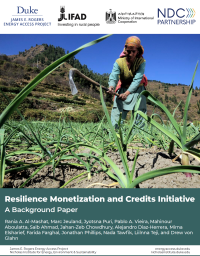Energy Access Project Working Paper Series

Aims and scope
The mission of the Energy Access Working Paper series is to provide an outlet for novel and policy-relevant theoretical and empirical research that is related to energy access and transitions challenges, especially those facing low- and middle-income countries (LMICs) and populations. We are particularly interested in providing scholars in the Global South with an opportunity to submit their work in progress, to support dissemination and build discussion around their research and ideas, and in working with those scholars to engage in discussions of their research relevance and implications, including with energy sector practitioners and policy-makers. We are committed to interdisciplinarity and team research and to confronting the dearth of social science research on energy access (relative to work in the engineering and natural sciences). We are further interested in elevating comparative work that sheds light on the energy transitions experiences of multiple geographies or populations.
Our overarching goal is to contribute to more rapid achievement of universal access to modern energy services. As such, we will publish review papers, original theoretical or empirical research studies, case studies, and methods studies that have relevance to achieving this goal.
More specifically, we are particularly interested in work that overlaps with the four workstreams of the Energy Access Project, though we will consider other papers that do not cleanly fit into these themes in some cases:
• Building equitable and sustainable energy transitions;
• Harnessing data and modern technology;
• Modernizing energy access finance; and
• Powering productivity and health communities.
Each of these is explained in additional detail below. Published papers in the Working Paper Series can be found below.
Building equitable and sustainable energy transitions: Globally, around 3 billion people lack access to affordable and reliable clean cooking energy, 860 million do not have access to electricity, and several billion more are constrained by low quality or unreliable service. This has major equity implications, as energy poverty disproportionately affects women and girls, and rural, natural resource-dependent populations. These inequities are driven by historical structural marginalization, differences in gender roles that are dictated by social and cultural norms, a lack of opportunities outside of climate-sensitive livelihoods activities, and by asymmetric effects of global shocks such as pandemics.
Harnessing data and modern technology: The proliferation of Earth observation satellites, vehicle-mounted cameras, smart meters, cookstove sensors, various crowdsourced platforms, and other innovative technologies provide new opportunities for advancing sustainable energy access. These technologies constantly generate and/or aggregate data which may be analyzed using deep learning techniques to reveal patterns that can guide improved planning, policymaking, and investment. We seek to bring attention to novel methods and applications of data, developed to advance energy access goals.
Modernizing energy access finance: Now more than ever due to dramatic cost declines and increasing climate change concerns, renewable off-grid energy systems are poised to play a central role in advancing global energy access goals. Yet less than 2% of the $36 billion in annual investment flowing into electricity access is going to off-grid solutions, and evidence on the relative benefits of alternative electrification pathways remains limited. Papers addressing these disconnects and solutions to energy finance bottlenecks are encouraged, especially where lessons can be learned that are apply across geographies, disciplines, and timeframes.
Powering productivity and healthy communities: At least two billion people have access to energy sufficient to light their homes and charge their cell phones, but live without the reliable, higher quality power needed to support industry, commerce, and modern health systems. People in these communities face reduced economic mobility and human capital development opportunities. We seek to better document the health, ecological, and financial burdens that come with increased reliance on diesel generators and highly polluting household fuels—common substitutes for clean, modern, reliable energy systems—as well as effective strategies to boost productive energy uses.
Eligibility
Duke-affiliated researchers, Energy Access Project affiliates, and Sustainable Energy Transitions Initiative members are encouraged to submit their work. If you have questions about your eligibility to publish in the series, please contact marc.jeuland@duke.edu.
Latest Papers
-
Working Paper - May 2024


